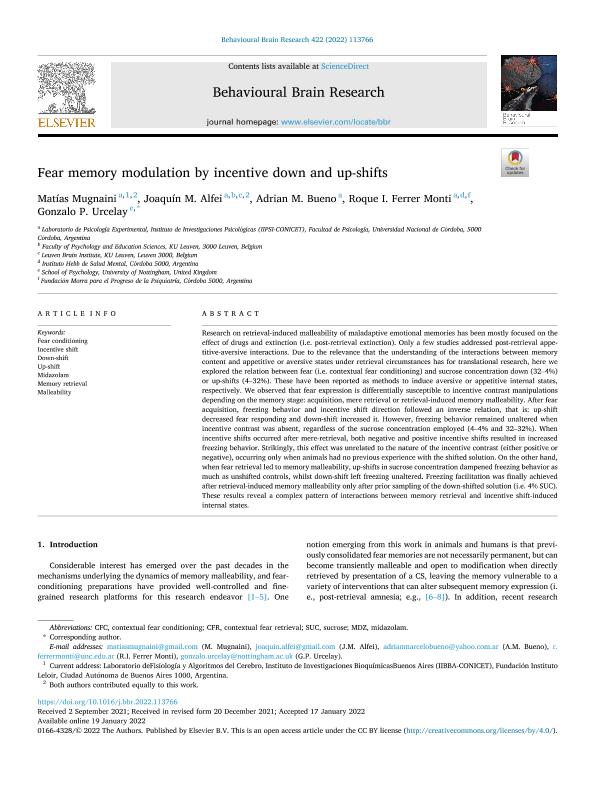Artículo
Fear memory modulation by incentive down and up-shifts
Mugnaini, Matías ; Alfei, Joaquín M.; Bueno, Adrián Marcelo; Ferrer Monti, Roque Ignacio
; Alfei, Joaquín M.; Bueno, Adrián Marcelo; Ferrer Monti, Roque Ignacio ; Urcelay, Gonzalo Pablo
; Urcelay, Gonzalo Pablo
 ; Alfei, Joaquín M.; Bueno, Adrián Marcelo; Ferrer Monti, Roque Ignacio
; Alfei, Joaquín M.; Bueno, Adrián Marcelo; Ferrer Monti, Roque Ignacio ; Urcelay, Gonzalo Pablo
; Urcelay, Gonzalo Pablo
Fecha de publicación:
03/2022
Editorial:
Elsevier Science
Revista:
Behavioural Brain Research
ISSN:
0166-4328
Idioma:
Inglés
Tipo de recurso:
Artículo publicado
Clasificación temática:
Resumen
Research on retrieval-induced malleability of maladaptive emotional memories has been mostly focused on the effect of drugs and extinction (i.e. post-retrieval extinction). Only a few studies addressed post-retrieval appetitive-aversive interactions. Due to the relevance that the understanding of the interactions between memory content and appetitive or aversive states under retrieval circumstances has for translational research, here we explored the relation between fear (i.e. contextual fear conditioning) and sucrose concentration down (32–4%) or up-shifts (4–32%). These have been reported as methods to induce aversive or appetitive internal states, respectively. We observed that fear expression is differentially susceptible to incentive contrast manipulations depending on the memory stage: acquisition, mere retrieval or retrieval-induced memory malleability. After fear acquisition, freezing behavior and incentive shift direction followed an inverse relation, that is: up-shift decreased fear responding and down-shift increased it. However, freezing behavior remained unaltered when incentive contrast was absent, regardless of the sucrose concentration employed (4–4% and 32–32%). When incentive shifts occurred after mere-retrieval, both negative and positive incentive shifts resulted in increased freezing behavior. Strikingly, this effect was unrelated to the nature of the incentive contrast (either positive or negative), occurring only when animals had no previous experience with the shifted solution. On the other hand, when fear retrieval led to memory malleability, up-shifts in sucrose concentration dampened freezing behavior as much as unshifted controls, whilst down-shift left freezing unaltered. Freezing facilitation was finally achieved after retrieval-induced memory malleability only after prior sampling of the down-shifted solution (i.e. 4% SUC). These results reveal a complex pattern of interactions between memory retrieval and incentive shift-induced internal states.
Archivos asociados
Licencia
Identificadores
Colecciones
Articulos(IIBBA)
Articulos de INST.DE INVEST.BIOQUIMICAS DE BS.AS(I)
Articulos de INST.DE INVEST.BIOQUIMICAS DE BS.AS(I)
Citación
Mugnaini, Matías; Alfei, Joaquín M.; Bueno, Adrián Marcelo; Ferrer Monti, Roque Ignacio; Urcelay, Gonzalo Pablo; Fear memory modulation by incentive down and up-shifts; Elsevier Science; Behavioural Brain Research; 422; 3-2022; 1-15
Compartir
Altmétricas



